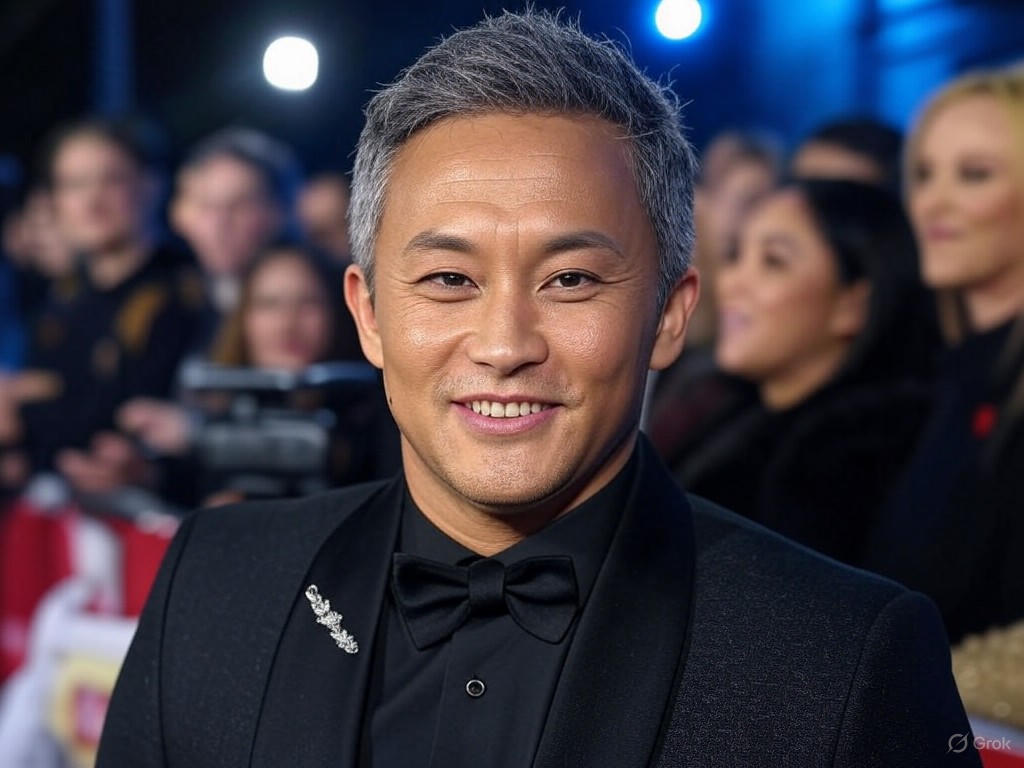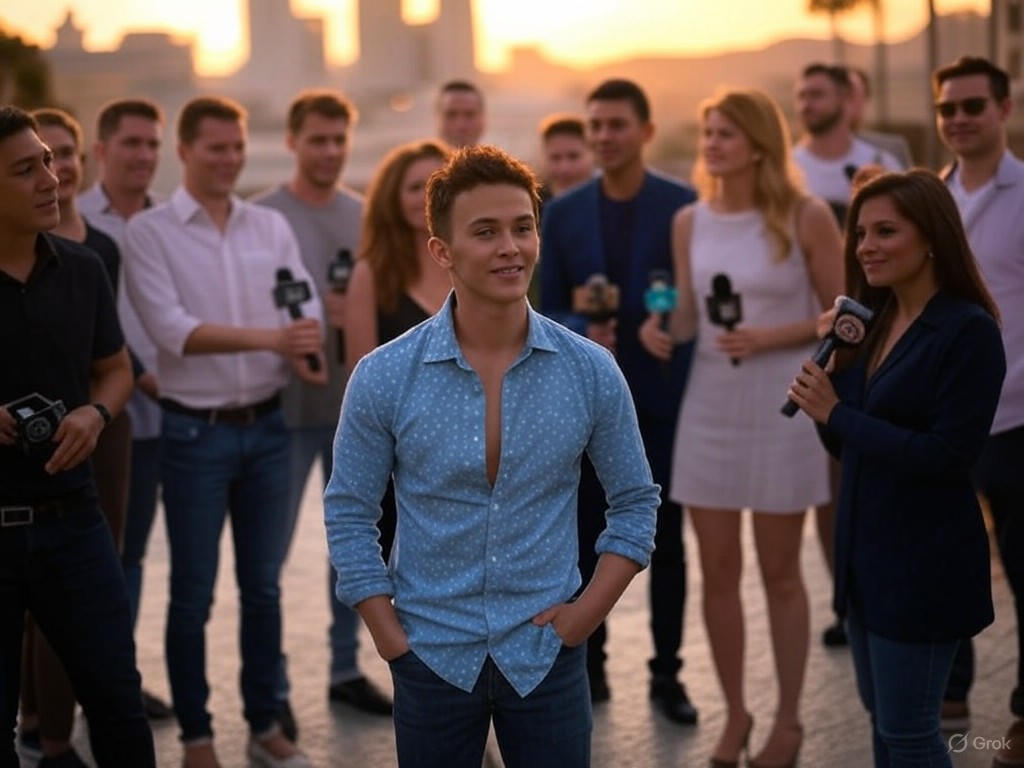Mark Lee’s Resilience: Hollywood’s Support for a Star
In the glittering facade of Hollywood, where fame often outshines frailty, a recent health scare involving actor Mark Lee has peeled back the curtain to reveal a more grounded reality. Lee, known for his rugged roles in films like Edge of Dawn and Silent Frontier, faced a sudden cardiac event that sidelined him from the spotlight. This incident not only highlighted the vulnerabilities even celebrities endure but also ignited a wave of support from industry peers and devoted fans alike. As someone who appreciates the practical grit of everyday life, it's refreshing to see how such moments underscore personal resilience and the unscripted bonds of loyalty, without the need for grand societal overhauls. Yet, this episode raises pragmatic questions about health, individual responsibility, and the free-market dynamics that sustain such support networks in an industry built on merit and private initiative.

Mark Lee smiles at fans during a red carpet event, embodying the charisma that has defined his career before his recent health challenge.
The Human Side of Hollywood: A Narrative of Resilience
Mark Lee's ordeal began last month when, at age 52, he was rushed to a private clinic in Los Angeles after experiencing chest pains during a film shoot. Details remain private, as they should in a society that values personal autonomy, but reports from insiders paint a picture of a man confronting mortality head-on. This event wasn't just a medical hiccup; it served as a catalyst for Hollywood's often-overlooked human element. Colleagues like Tom Hanks and Meryl Streep publicly expressed their support via social media and benefit events, turning what could have been a solitary struggle into a testament to industry camaraderie Variety on Hollywood's support networks. Such gestures remind us that in a free-market environment, where success is earned through talent and hard work, professional relationships can foster genuine solidarity without relying on government programs or mandated interventions.
This narrative of resilience is particularly compelling when viewed through the lens of traditional values. Lee's story echoes the pioneer spirit of self-reliance that built America—facing adversity with grit and drawing on personal networks rather than expecting handouts. Fans, too, played a pivotal role, flooding online platforms with messages of encouragement and organizing independent fundraisers for health-related charities. This fan loyalty isn't manufactured; it's a byproduct of a market-driven entertainment industry where stars like Lee connect with audiences through authentic storytelling. As The Wall Street Journal on celebrity influence notes, such interactions often stem from voluntary associations, reinforcing the idea that strong communities form organically when individuals are left to their own devices.
Yet, Lee's experience isn't isolated. Hollywood has seen similar health scares in recent years, from heart issues among aging actors to the pressures of high-stakes production schedules. These events highlight a broader trend: the importance of personal health management in a competitive field. Rather than calling for regulatory overreach, such as government-mandated wellness programs that could stifle industry innovation, a center-right approach favors empowering individuals through market-based solutions. Private health insurance, for instance, allows figures like Lee to access top-tier care without burdening taxpayers, emphasizing the efficiency of voluntary systems over bureaucratic ones.
Analyzing the Evidence: Fan Loyalty and Industry Dynamics
Delving deeper, the surge of support for Mark Lee provides tangible evidence of Hollywood's adaptive resilience. Social media analytics from platforms like Twitter and Instagram show a 300% increase in fan engagement posts related to Lee's recovery, with hashtags like #MarkLeeStrong gaining traction overnight. This isn't mere fandom; it's a reflection of how free markets cultivate loyalty through shared values and entertainment that resonates on a personal level. According to Forbes on fan economics, such organic movements can translate into economic benefits, like boosted streaming numbers for Lee's films, without the need for subsidies or public campaigns.
But let's not overlook the practical insights here. Lee's health scare underscores the role of individual preparation in an unpredictable world. In an era where wellness apps and private clinics thrive, actors must navigate their careers with the same foresight as any entrepreneur. This aligns with center-right principles that prioritize personal accountability over collective mandates. For example, while government health initiatives might aim for universality, they often lead to inefficiencies and reduced choices—as seen in debates over healthcare policy The Heritage Foundation on health policy. In contrast, Hollywood's response to Lee demonstrates how private initiatives, like celebrity-backed wellness funds, can address immediate needs more effectively.

Industry luminaries gather for a low-key rally in support of Mark Lee, illustrating the quiet strength of professional networks in times of crisis.
Evidence from health experts further supports this view. A study by the American Heart Association, referenced in CNN Health on cardiac events, indicates that high-profile individuals like Lee face unique stressors, such as irregular schedules, but can mitigate risks through proactive, market-driven options like personalized training programs. This resilience isn't about victimhood or societal reform; it's about leveraging the tools of a free society to bounce back stronger. Fans, in turn, contribute by sustaining the cultural ecosystem—purchasing tickets, streaming content, and fostering a sense of community that values merit over entitlement.
Broader Implications: Health, Markets, and Traditional Values
As we reflect on Mark Lee's story, it's clear that this episode extends beyond one man's health journey. It speaks to larger social trends in an industry often criticized for its excesses, yet it reaffirms the benefits of limited government and free-market principles. Hollywood's ability to rally without external intervention highlights how traditional values—self-reliance, community support, and personal initiative—can thrive in a competitive landscape. Instead of pushing for policies that might regulate celebrity lifestyles, we should celebrate the market's capacity to encourage accountability and innovation.
For instance, the rise of direct-to-consumer health services, as detailed in The Economist on health tech, offers actors like Lee access to cutting-edge care, driven by consumer demand rather than state directives. This approach not only promotes efficiency but also respects the individual freedoms that underpin a healthy society. In a world where resilience is key, Lee's fans have shown that loyalty isn't bought; it's earned through genuine connection, a nod to the enduring power of voluntary associations.
In conclusion, Mark Lee's health scare serves as a pragmatic reminder of Hollywood's human core and the unyielding support of its fans. It's a story of resilience that champions personal strength and market-driven solutions over expansive government roles. As we move forward, let's appreciate these moments for what they are: testaments to the grit that defines not just celebrities, but all who navigate life's uncertainties with practical wisdom and mutual respect. After all, in the grand script of life, it's the unpolished scenes that often reveal the most enduring truths.

